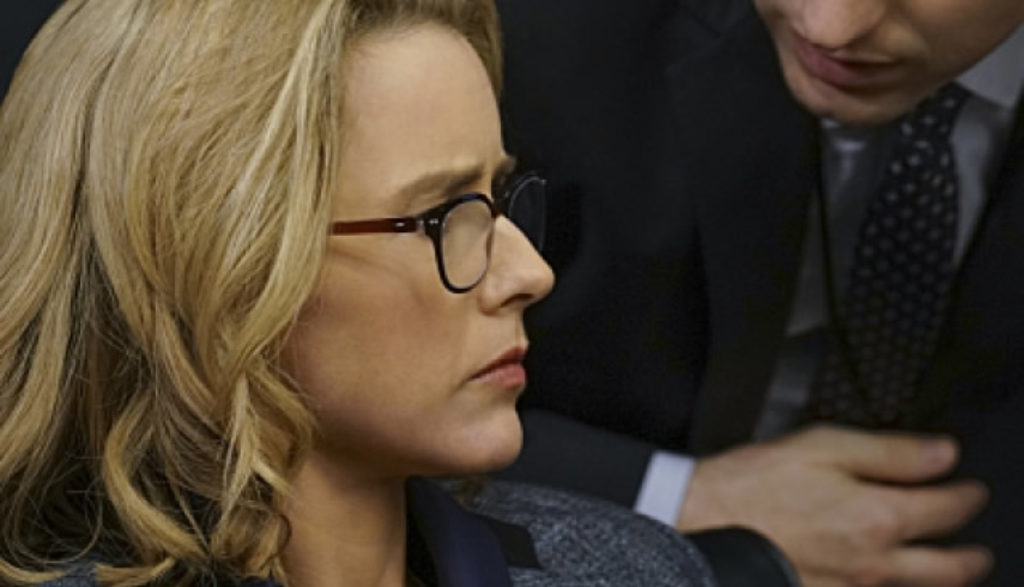
Star Wars: Young Jedi Adventures
Parents may want to exercise some caution before sharing this kid-focused Star Wars show with their own younglings.

It’s not every day that a soccer mom gets picked for one of the world’s most important, most intricate jobs. So will it be politics as usual? Not if Elizabeth McCord has her way.
Not that Elizabeth is exactly a foreigner to inside-the-beltway pressure. She is, after all, a former CIA analyst with a whip-snap mind and a no-nonsense reputation. She knows how to speak diplomatically when need be—and when to keep her trap shut, too. Sure, she can twist the occasional arm. But Elizabeth understands that sometimes what world leaders need is just a big ol’ hug.
Sound a little motherly? It should. Because when she’s not slapping international policy together, or running for President (and winning), she’s slapping mayo on sandwich bread and coaching her kids through life. Elizabeth may be the most powerful person in the world, but for her, Job No. 1 is being a good mom. And her commitment to family—her husband, Henry, and their three children—gives her, arguably, the out-of-the-White-House-box viewpoint that the White House needs.
Madam Secretary asks us, in our super-cynical age, to think of government as truly being of the people, the sort of people who we might pass in the supermarket—only smarter and better dressed. It suggests that Washington can be better at times than we give it credit for, and that it could be better yet with a little more common sense. And while some initially called Madam Secretary (which was released in 2014) a CBS commercial for former Presidential contender Hilary Clinton, Elizabeth’s political leanings aren’t always that clear, and not particularly alienating even when they are.
The show itself takes cues from its fictional characters. Like Elizabeth, it’s competent and efficient. But like her environs, things can sometimes get a little … dingy.
“Everything is more complicated than you think right now,” Elizabeth tells her daughter Stevie, but she might also be warning us of things to come. Both Elizabeth and Henry hold deep secrets, even from each other. Elizabeth suspects that the government she now runs may have had something to do with the death of her predecessor. Flashbacks to her previous gig as a CIA wonk hint at a violent underbelly. And you’ve heard that politics makes strange bedfellows? These characters sometimes do indeed share sheets.
But while Madam Secretary (which, as of 2019, was entering its last season) has its problems, it’s better and cleaner than we’ve seen lately from any of the other Washington-based dramas. While shows like Scandal and State of Affairs swim in salacious waters, and Netflix’s recently departed House of Cards does some deep-sea diving in the stuff, Madam Secretary seems content to walk along the edge of the surf.
(Editor’s Note: Plugged In is rarely able to watch every episode of a given series for review. As such, there’s always a chance that you might see a problem that we didn’t. If you notice content that you feel should be included in our review, send us an email at letters@pluggedin.com, or contact us via Facebook or Instagram, and be sure to let us know the episode number, title and season so that we can check it out.)
President Elizabeth McCord faces angry protestors over her decision to implement a fuel tax. President McCord’s former campaign manager, Mike Barnow, is questioned by Senate Intelligence regarding a possible scandal.
An elderly congressman dies while sitting on the toilet (we see his bare thighs and dead, slumped-over body). A wife shares that her husband died of an overdose. A campaign manager is falsely accused of murder. Elizabeth tries to save a dying bird.
An elderly woman tells her story of getting pregnant at 16. An elderly man calls his niece a “loose woman.” A couple kisses and flirts. Men and women alike consume hard liquor and mixed drinks. A councilman jokingly says he’d like a minibar.
A man tells his colleague “we’re going to hell.” God’s name is misused twice and words like “h—,” “d–n” and “d–mit” are each heard once or twice.
Elizabeth and her team hold a NATO summit to try and reconcile long-standing enemies, Serbia and Albania. But before they can end years of turmoil, they’ll have to figure out which country is trying to cause political unrest using social media. Henry, who now works at the White House in anti-terrorism, must learn to navigate his new role amidst decades of tradition.
People talk about years of violent conflict between Baltic territories, a pattern repeated today as innocent civilians are killed by mobs due to vicious rumors on social media. We hear discussion, accusations and rumors of rape, murder, mass graves, ethnic cleansing, kidnapping, the killing of children and illegal nuclear power. Tensions run high during a discussion of a previous Russian attack on U.S. soil.
Couples kiss and there’s a discussion of foreplay. A doctor prescribes medication illegally and a government official is high after taking too many pills. A reference to marijuana is heard. Men and women casually consume beer and wine. A little girl is called an “Albanian rat” and a man says “h—.”
After undergoing brain surgery, the President is cleared to return to the White House, but he is unsure of his own capability. As a result, he reminisces over his long road to entering politics and questions his current position as a leader.
The president of Burma/Myanmar visits the United States to receive the Medal of Freedom, but Elizabeth and her staff find that this beacon of hope may be ignoring the ethnic cleansing taking place in his own country.
A few words slip, such as “h—” and “dumba–.” There’s much conversation concerning ethnic cleansing, genocide and violence. We see pictures of destruction in Burma and children’s drawings of the violence they witness. Presidential staff members ogle the president of Burma. A man who suffers from bipolar disorder lies on a hospital bed, recovering from multiple beatings. A few people play cards to win money and food. A young girl thinks less of those who aren’t as educated as herself.
Elizabeth goes to Myanmar to sign a critical trade agreement—but must deal with the reservations of the U.S.’s ambassador to the country. Meanwhile, the McCords’ new neighbors are getting fed up with the inconvenience of having the Secretary of State live next door.
The ambassador has converted to Theravada Buddhism, shaving his head and wearing robes. He also takes the Myanmar president hostage at gunpoint and is himself shot and wounded (offscreen). Elizabeth tries to bone up on Buddhism, and she uses its concept of the “Middle Way” (similar to the Greek “Golden Mean”) to diffuse several issues.
Nadine, Elizabeth’s right-hand assistant, tries to reconcile with her estranged son (who is living with his girlfriend). Nadine and another staffer, Blake go to a karaoke bar, quaffing hard liquor and praising the combination of alcohol and song.
There’s conversation about divorce, climate change and the potential extinction of spider monkeys. Blake worries about end-of-the-world scenarios. Characters say “h—” and “d–n” once or twice. God’s name is misused, but there are also references to prayer.
An Iranian interpreter recognizes Elizabeth from a covert mission and tries to blackmail her into treating his faction more favorably. The plan doesn’t work, but it does force Elizabeth to confess to Stevie, who now sees her mother as a torturer. Meanwhile, Matt tells Daisy’s fiancé—a lobbyist pushing for the legalization of marijuana—that he and Daisy had an affair.
When Matt admits he smokes cigarettes when stressed, the lobbyist gives him a piece of gum to chew instead. Matt doesn’t realize that it’s laced with pot until he starts getting silly, punching the guy in the ear. He kisses Daisy when she gets dumped. We hear quips about marijuana use.
A gunman forces the White House into lockdown. (We see him smoke a cigarette and bow his head to pray before picking up his gun and getting out of the car.) In flashback, Elizabeth questions a terrorist who repeatedly shouts that Allah is great. Screams of pain seem to indicate that the man is being tortured.
There’s talk of wanting something stronger to drink than tea. Characters say “d–n,” “b–ch,” “h—” and “b–tard” once or twice each. God’s name is misused a few times.

Paul Asay has been part of the Plugged In staff since 2007, watching and reviewing roughly 15 quintillion movies and television shows. He’s written for a number of other publications, too, including Time, The Washington Post and Christianity Today. The author of several books, Paul loves to find spirituality in unexpected places, including popular entertainment, and he loves all things superhero. His vices include James Bond films, Mountain Dew and terrible B-grade movies. He’s married, has two children and a neurotic dog, runs marathons on occasion and hopes to someday own his own tuxedo. Feel free to follow him on Twitter @AsayPaul.

Kristin Smith joined the Plugged In team in 2017. Formerly a Spanish and English teacher, Kristin loves reading literature and eating authentic Mexican tacos. She and her husband, Eddy, love raising their children Judah and Selah. Kristin also has a deep affection for coffee, music, her dog (Cali) and cat (Aslan).

Parents may want to exercise some caution before sharing this kid-focused Star Wars show with their own younglings.

Rife with disturbing content and sexual material, the real malice shown by this psychological thriller is toward its audience.

Tony DiTerlizzi’ popular sci-fi book series migrates to Apple TV+, telling a dystopian tale about a lonely girl, friendship and family that families just might like.

In NBC’s sitcom, Happy’s Place, Bobbie must learn to share ownership of her late father’s tavern when she discovers she has a little sister, Isabella.